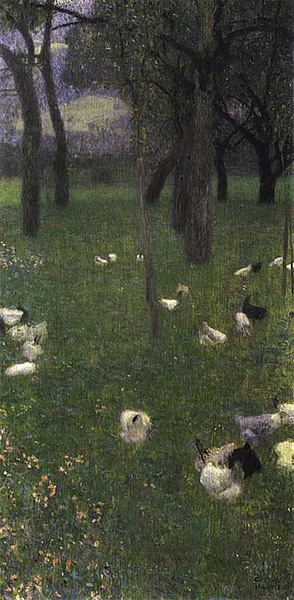After The Rain (1899) transcends the smooth landscape of scattering trees and animals into a sloping background into the nature of the environment.
The colours illuminate an array of focal points throughout the piece, accentuating the chickens within the painting. Gustav Klimt's painting was based on the gardens of St Agatha in Vienna.
The painting illustrates a wide meadow of cool green grass, sloping into the horizon of the piece. Trees scatter the painting, with dark brown barks and leaves flourishing out of the branches. Chickens swarm the plains in shades of white, black, grey, and shades of purple accompany the garden.
These animals are muddied into the grass, hiding their features to only be left with an outline. Small flowers grow within the garden, creating the presence of a meadow in he shades of yellow scattered across.
The garden transcends into the beautiful meadow, eventually into a deep forest as the trees thicken within the background.
The sky is painted with a soft sponge technique, in deep shades of blue, accentuated through a light purple. Two clouds scatter the sky, covered by the deep leaves growing out of the trees.
The piece encompasses the style of modernism at the midst of Klimt's career, illustrating his impressionist technique. Whereas Klimt will eventually move away from the realist and modern style that ruled the era, to an Art Nouveau that accentuated his gold phase, the piece illustrates the classic style most prominent at the time.
After The Rain is based on a cool colour scheme, based on an array of green colours. The green colour palette holds as the focal point of the painting, through a lighter cool tone green used for the meadow of the piece. A darker deeper green is used for the leaves growing from the tree, transcending into a green-black colour for the trees at the horizon. The hint of purple in the sky adds a pop of colour to the piece, alongside the yellow flowers that scatter the garden.
The painting holds the cool colour presence within the colour scheme in order to engulf the viewer with an emotion. As evident through the title, the painting is meant to portray the landscape of the garden after the rain. The emotion obtained through the piece is the dark gloomy feeling one is seized in upon the completion of a storm. Instead of illustrating the light and positivity that arises post rain, Klimt decided to illustrate the melancholic feeling the rain upraises in one.
The theme of landscapes is not a common signature of Klimt's work, however pays tribute to the modernist impressionism technique that holds as the foundation of his style.




